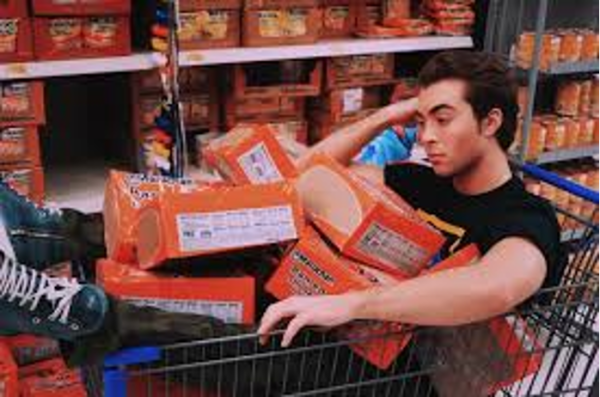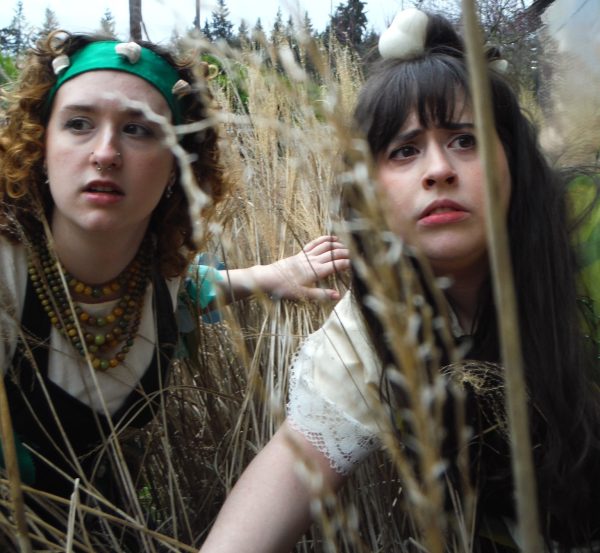Earth Day Kickoff
Edmonds Community College started Earth Month with a fair on April 17th where students and staff could learn how to be more sustainable while earning stamps for a free meal.
Staff from various departments were at the event, along with people from outside the campus. Among those that I noticed were staff from the library, Biology department, the campus community farm, as well as representatives from the Washington Department of Fish and Wildlife and from Seattle Area Feline Rescue (SAFe). Many people attended the event, filling up the Brier student lounge. This is great because many people were exposed to the education the event offered, but sad because they ran out of burgers towards the end of the event. But on the bright side, it means food didn’t get wasted.
Gwen Shlichta, who was there representing the Bee Club, was especially adamant about the event. “Little things really matter. Think about all the single-use plastic you use,” said Shlichta. We discussed how much individual action matters. If everyone believes that their single-use plastic won’t make a difference in the long run, then that remains the norm and we end up using more plastic than we need to. We specifically talked about the impact of single-use plastic water bottles. “If we said ‘we will not buy your plastic’ all the companies would have it in a carton,” said Shlichta. “We’re the educated people,” said Shlichta. Because we’re the educated people, we need to be the ones to take action because we know better.
For the Bee Club, that means educating people about bees. Bees are vital to our ecosystem, as was explained in one of the pamphlets from the Bee Club’s table. “As a group, these and other pollinators maintain healthy, productive plant communities, provide food that sustains wildlife, and plan an essential role in crop production,” said the pamphlet from the Xerces Society for Invertebrate Conservation.
“We just want people to know about the bees, we’re not demanding [as a club],” said Shlichta.
But not all animals are good for all ecosystems, as I learned from Chelsey Buffington, the representative from the Washington Department of Fish and Wildlife. They work to monitor ecosystems for invasive species that can wreak havoc on local ecosystems, as well as water pipes. The species we specifically talked about were Zebra Mussels, which can clog water intakes, requiring costly repairs. “Early detection monitoring is the cheapest route, because if you look at other water bodies that have them it costs hundreds of millions of dollars to maintain them,” said Buffington. “I’m educating people on things we look out for.”
What we can do to prevent the spread of Zebra Mussels? Learning to recognize them is one of the most important things, (go Google a picture, they’re very tiny but in large groups they cause great damage). You also want to dry anything that’s been in a body of water for at least five days (think dinghies, kayaks, scuba gear. Your swimsuit should be fine) You also never want to introduce plants or animals from one body of water to another, as this can spread them to other water bodies.
Speaking of invasive species, as well as overpopulation, I got to talk with Nichole Abbey and Serena Freeman about the importance of spaying and neutering cats so as to prevent there being an excess of cats in the world. “We saved over 1,700 cats last year,” said Abbey. “We also spay and neuter all the cats that come through,” said Freeman. They take in cats from all over the world and help them to find permanent home. “We’re still helping animals find their place in the world cause they deserve it just like we all do,” said Abbey. “We are incredibly grateful for our community and volunteer support and we couldn’t what we do without them.”
SAFe Rescue is located just north of the border between Seattle and Shoreline, and they’re happy to take in new volunteers. “SAFe Rescue relies on the support of volunteers in order to save homeless cats,” says their website, seattleareafelinerescue.org, where you can find the forms required to become a volunteer. “Anyone who wants to come help us, we’ll take ‘em!” said Abbey.
Finally, I had a chance to talk with Clara Degez and Michelle Brewer about the Campus Community Farm.
“The farm promotes species preservation,” said Degez. “The bee club has a hive there so they pollinate the farm[…] You need pollinators to have fuel.” Brewer adds on, “The farm is a unique place where people with diverse interests and backgrounds can share a common purpose to learn life skills and support their community.”
However, Brewer can see how the farm could be better, both for those who work there and the campus overall. “I envision that the campus farm gets more funding and that we expand the farm to support the systems already on campus.” But to do that, they need more people to volunteer there. “If people were to look towards us to getting our service learning hours, if more and more people do that, there would be a better reason to expand. There’d be more staff which means more food,” said Brewer. In my experience, the farm is a relaxing way to earn service learning hours, whether it’s for a class or for personal fulfillment. “A lot of people build friendships there … It’s like a break but you could be earning something to put on your resume,” said Brewer.
All in all, the kickoff was a success. Attendees got a free meal, as well as the vital knowledge that is needed to make a better world. “You guys! You’re gonna save us!” said Shlichta. “It’s your generation that’s going to make a difference. You matter.”





